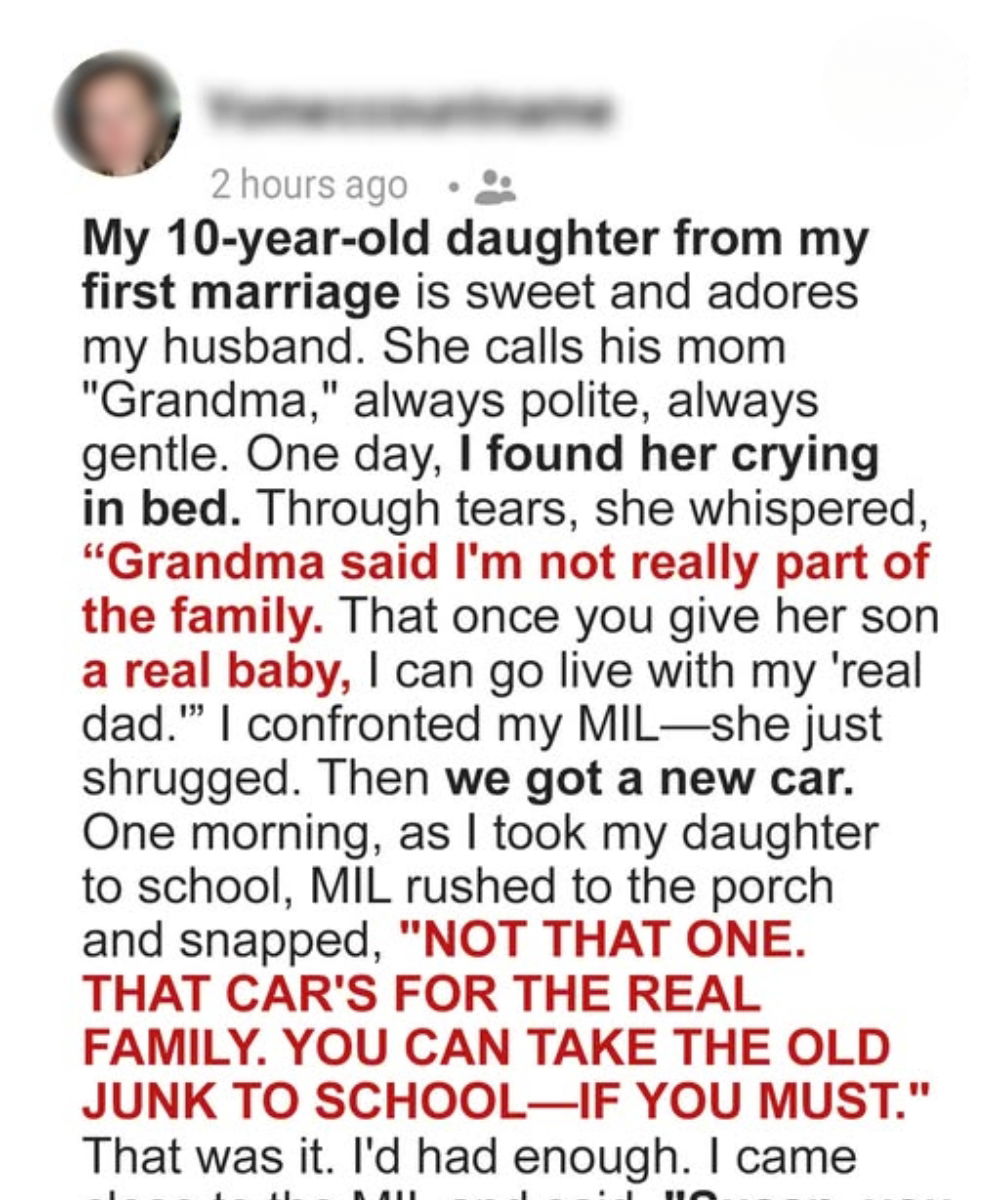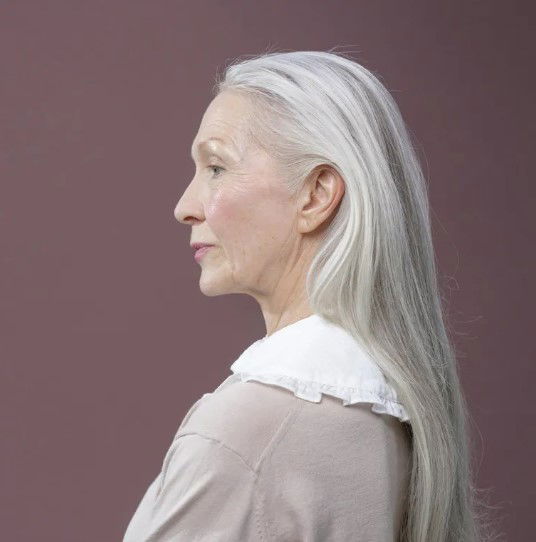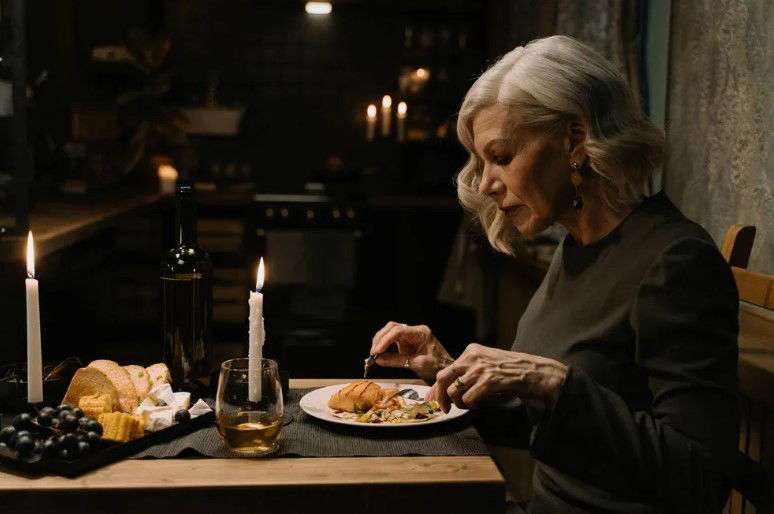
I’m 34 years old, with a daughter named Lily from my first marriage.
When I married again, I truly believed I was joining a kind and supportive family.
I tried to keep the peace with my new mother-in-law, but what began as tolerating her subtle digs turned into a moment that changed our family for good.
Lily is ten now, a sweet and empathetic child with a heart of gold. She’s the sort of kid who offers napkins to strangers who are crying.
She calls my husband, Mark, “Dad” without hesitation, because he has been nothing short of a real father since she was six.
When I met Mark, he didn’t balk at the idea of taking on a single mom with a young daughter.
Instead, he stepped into the father role wholeheartedly, giving Lily the stability and love she’d been missing since her biological dad, Tom, abandoned her when she was just two.

Tom never paid child support, slipping away whenever I tried to hold him accountable.
Mark, on the other hand, suggested we move in with his mom, Susan, when we married, since money was tight and we were trying to save for a home.
He’d just switched careers, and I was doing freelance work while homeschooling Lily.
We saw living with Susan as a short-term challenge — six to nine months, max. Looking back, we were painfully naive.
At first, Susan played the part of a loving grandmother, smiling and showering Lily with presents.
But underneath, she made no secret of her opinions. When Mark was home, she was sugar-sweet.
When he was away, her true feelings showed. Her tone changed, her warmth faded, and her eyes turned cold.

“She’s nice enough, but not real family,” she once muttered to me while passing the potatoes.
It hurt, but Mark dismissed it.
“She doesn’t mean it. She’s old-fashioned,” he’d say, trying to smooth things over.
I wanted to believe him, especially since Lily seemed to adore Susan and happily called her Grandma.
As the years passed, I relaxed my guard. Susan kept up appearances for birthdays and holidays, giving gifts with a forced smile.
I convinced myself that maybe she had finally accepted Lily.
But then, one night, I found Lily curled up in bed, hugging her stuffed dolphin, eyes red from crying.

“What’s wrong, sweetheart?” I asked.
Her voice shook. “Grandma said I’m not part of the real family. That after you have a real baby with Dad, I’ll have to live with my other dad.”
My heart broke, and fury burned through me. I confronted Susan in the kitchen.
She brushed me off with a dismissive wave, claiming she was only joking.
Mark was furious when I told him, at first.
But soon enough, he excused it, insisting his mom was “from a different generation” and didn’t mean to cause harm. I couldn’t let that slide.
I installed security cameras in the living room and on the porch. I saved Susan’s texts and recorded her cruel words. I was done being gaslit.
Then came the incident with the car. Mark and I had worked hard to buy a new SUV — a gorgeous midnight blue with leather seats.

Lily was enchanted by it, thrilled for a fresh start with something that felt special.
On the first school day after we got it, she ran outside, buckled in, eyes bright with excitement.
But Susan stormed onto the porch, coffee in hand, and spat out, “Not that car. That’s for the real family. Take the old junk instead.”
Lily shrank into her seat, clutching her belt.
I fought to stay calm, told Lily to wait, and turned to Susan. “You are going to regret this,” I told her firmly.
Then I drove Lily to school, holding her hand at red lights, swallowing my heartbreak.
That night, I cued up the security footage. I hadn’t told anyone about the cameras, not even Mark.
As he watched Susan’s unfiltered cruelty unfold on screen, his face drained of color, then flushed red.

“She actually said that to her?” he whispered.
Mark covered his face, shaken. I told him it was time to confront her, and he agreed.
The next evening, we invited Susan to a “special family dinner,” hinting at good news to lure her into a civil mood.
I’d arranged for Lily to stay overnight at a friend’s house, sparing her from what was to come.
Susan arrived in pearls, a fruit tart in hand, expecting a celebration. After dessert, I cleared my throat.
“Susan, we have news,” I began.
Her face lit up. “A baby?”
“Yes,” I said, smiling tightly. “I’m pregnant.”
She clapped in glee. “Finally — a real grandchild!”
Then I pulled out my phone and played the security footage. Her hateful words filled the room. Susan’s smile dropped.
She stood up, voice shaking with outrage. “That child isn’t even Mark’s!”
Mark finally spoke. “She’s mine in every way that matters. If you can’t accept her, you can’t be part of this family.”
Susan sputtered, “You’re throwing me away for her?”

“She is a child,” I answered, voice steady. “And she is more family than you’ve ever been.”
Susan tried to argue, but I shut her down. “We made an offer on a house. It closes in three weeks. You won’t see us again.”
She shouted that we were overreacting, but I stayed firm. “Protecting my children is my job.”
Mark stood beside me, arm around my shoulders. “This family comes first,” he said.
We left shortly after, living with a friend until our house was ready. We never went back.
A year later, Lily sat in our new living room, holding her baby brother with a bright smile. I took a picture of them, light streaming through the window, and turned it into a postcard.















